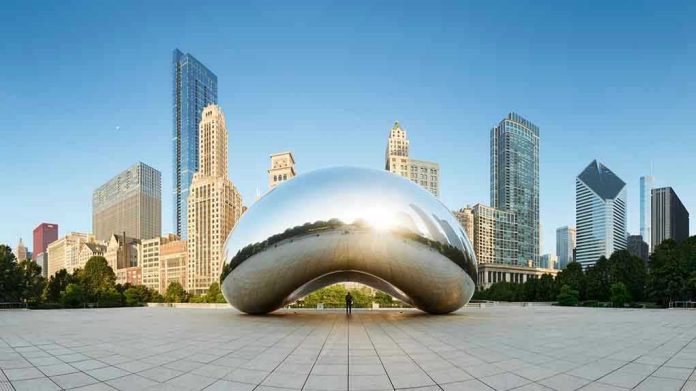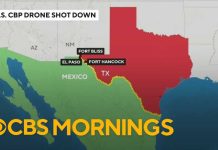
Chicago’s new “ICE-free zones” are fueling a constitutional showdown as federal agents warn these policies put law enforcement and public safety at risk while emboldening anti-American activist agendas.
Story Snapshot
- Chicago designates city property as “ICE-free zones” to block federal immigration enforcement, escalating conflict with President Trump’s administration.
- Federal agents criticize the move, saying it endangers operations and encourages protesters who oppose the rule of law.
- Illinois and Chicago launched a lawsuit to challenge the deployment of National Guard troops used to enforce immigration laws.
- The standoff highlights growing resistance to federal authority and raises vital questions about constitutional order and local overreach.
Chicago’s “ICE-Free Zones” Challenge Federal Immigration Authority
On October 6, 2025, Chicago Mayor Brandon Johnson signed an executive order establishing so-called “ICE-free zones” on all city property, with an open invitation for private businesses to join. These zones are designed to block Immigration and Customs Enforcement (ICE) from conducting raids on city-owned facilities and any private property that does not explicitly consent. The move, unprecedented in its scope, comes in direct response to President Trump’s renewed crackdown on illegal immigration—including the deployment of National Guard troops to Chicago. Federal agents have condemned the policy, warning it would hinder their ability to enforce federal law and ultimately jeopardize public safety by sheltering individuals in violation of immigration statutes.
The city’s leadership, including Illinois Governor JB Pritzker, has framed the executive order as a necessary bulwark against what they describe as “unlawful federal overreach.” Johnson and Pritzker, both vocal critics of the Trump administration’s immigration agenda, filed a lawsuit challenging the federal deployment of National Guard troops the same day the executive order was signed. Their argument centers on claims that the federal government is violating local autonomy and constitutional protections by deploying military force to enforce immigration laws. While city officials insist that these zones are about protecting vulnerable communities, federal agents argue that such measures create operational chaos and embolden anti-enforcement protesters, placing both law enforcement and law-abiding citizens at risk.
Escalating Legal and Political Battle Between City and Federal Government
Chicago’s actions have triggered a direct legal confrontation between local and federal authorities. While city and state leaders tout the “ICE-free zones” as a defense of civil liberties, the Trump administration views these efforts as a blatant attempt to obstruct the enforcement of federal law. The federal government’s response has included deploying National Guard troops to assist ICE operations—a move rarely seen in American cities. Illinois and Chicago’s lawsuit against the federal deployment is now pending in federal court, with a judge set to hear arguments in the coming weeks. This legal standoff not only tests the limits of executive power but could set precedents that influence how cities nationwide respond to future federal actions.
Federal agents and law enforcement professionals have voiced concerns about the practical consequences of these sanctuary measures. Without cooperation from local authorities, ICE operations become more dangerous and less effective, potentially allowing criminal elements to evade justice. At the same time, Chicago Police Superintendent Larry Snelling has stated that local police will not arrest federal agents, an acknowledgment of the complicated jurisdictional landscape but also a tacit admission that the city’s “ICE-free” policy may be more symbolic than enforceable in practice. The gap between city directives and federal mandates creates confusion on the ground, with law enforcement caught in the crossfire of political agendas.
Impact on Public Safety, Community Tensions, and Constitutional Order
The rapid escalation of this struggle has immediate and long-term implications for public safety, community trust, and the integrity of the constitutional order. In the short term, operational disruptions and heightened protests are already straining law enforcement resources. The presence of National Guard troops on city streets, combined with city-backed sanctuary zones, has deepened divisions among residents and fueled a climate of uncertainty—especially among immigrant communities and law-abiding citizens alike. For federal agents, the inability to access city property or non-consenting businesses hampers investigations and increases risks during operations. Ultimately, these policies raise the question of whether local governments can selectively nullify federal law, a challenge that strikes at the heart of American federalism and threatens to erode the rule of law.
Looking ahead, the legal outcome of Chicago’s challenge could shape the future of immigration enforcement and sanctuary policies across the country. If courts side with the city, other jurisdictions may be emboldened to enact similar measures, further fragmenting national immigration policy. Conversely, a federal victory may reaffirm the supremacy of constitutional law and the need for cooperation between all levels of government. For conservatives concerned about unchecked local power and the erosion of national sovereignty, Chicago’s standoff is a stark example of why a strong, unified response is critical to preserving order and upholding the Constitution.
Expert, Law Enforcement, and Policy Perspectives
Legal scholars and immigration analysts have underscored the high stakes of this dispute. The involvement of the National Guard represents a rare and forceful federal intervention in local affairs, highlighting the seriousness with which the Trump administration views sanctuary measures. Law enforcement experts warn that the creation of “ICE-free zones” not only complicates federal operations but also emboldens protesters and activist groups who oppose any form of immigration enforcement. While city officials and activists argue these measures are essential for protecting vulnerable populations, critics counter that undermining federal law sets a dangerous precedent and places American communities at risk.
Federal agent says Chicago’s ‘ICE-free zones’ endanger operations, embolden protesters https://t.co/OtYUj8ro3t
— Fox News Politics (@foxnewspolitics) October 7, 2025
As the legal and political drama unfolds, Americans are left to decide what future they want for their cities and their country: one where local officials can unilaterally block federal law, or one where the Constitution and the rule of law prevail over political agendas and activist pressures.
Sources:
Chicago’s ICE-Free Zones Spark Showdown With Trump Administration — Time
Mayor Brandon Johnson Signs Executive Order Establishing ICE-Free Zones — The TRiiBE



